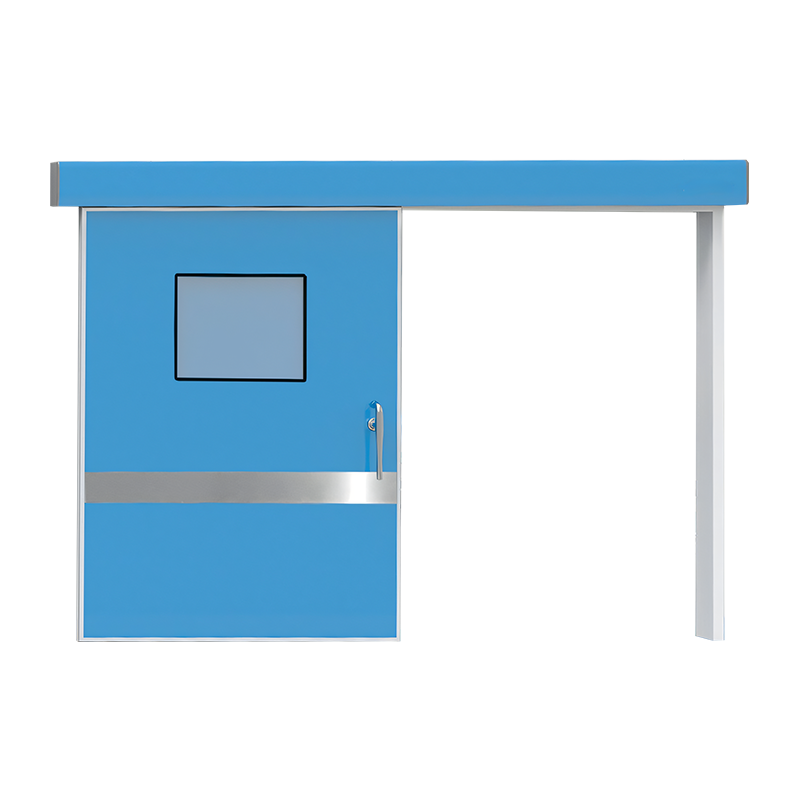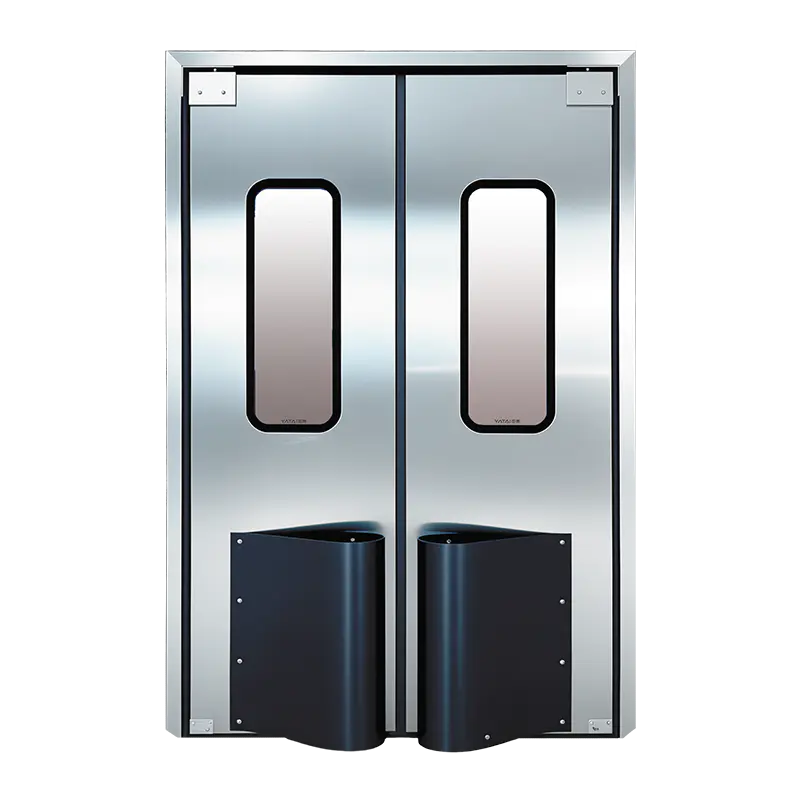What Industries Commonly Use Cleanroom Automatic Sliding Doors
Cleanroom automatic sliding doors are specialized doors designed to provide controlled access between areas that require high levels of cleanliness and controlled environmental conditions. Unlike ordinary doors, these doors are engineered to maintain sterile conditions, control airflow, and reduce contamination risks. They are widely used across industries where hygiene, precision, and contamination control are critical.
Pharmaceutical Industry
The pharmaceutical industry is one of the primary users of cleanroom automatic sliding doors. In pharmaceutical production, maintaining a contaminant-free environment is essential to ensure product safety and efficacy. Cleanrooms in this industry are used for manufacturing, packaging, and testing medications, vaccines, and other medical products. Automatic sliding doors allow personnel and equipment to enter and exit cleanrooms without introducing contaminants, as they can operate without physical contact.
The doors also help maintain positive or negative air pressure between rooms, preventing cross-contamination. For example, in areas where sterile drugs are produced, a positive air pressure ensures that air flows out of the room rather than in, reducing the risk of external contaminants entering the space. The automation of sliding doors supports strict hygiene protocols and facilitates smooth operations, especially when personnel wear protective clothing that may limit manual door handling.
Semiconductor Industry
Cleanroom automatic sliding doors are also extensively used in the semiconductor industry. Semiconductor manufacturing involves the production of microchips and electronic components that are highly sensitive to dust, particles, and environmental variations. Even microscopic contaminants can damage products, resulting in defects or production losses.
Semiconductor cleanrooms require precise control of temperature, humidity, and air quality. Automatic sliding doors help maintain these conditions by providing a tight seal and reducing air exchange with adjacent areas. The smooth and rapid operation of these doors minimizes the potential for contamination caused by personnel movement. Additionally, the use of sliding doors allows large equipment and materials to move efficiently between cleanroom areas without compromising sterility.
Biotechnology Industry
In the biotechnology industry, cleanroom environments are critical for research, development, and production of biological products such as proteins, enzymes, and cell cultures. Contamination can lead to inaccurate research results or compromised product quality.
Automatic sliding doors in biotechnology facilities help maintain the required cleanroom standards by limiting particle ingress and ensuring controlled airflow. The doors also enhance operational efficiency by enabling hands-free entry and exit, which is especially important when personnel handle sensitive biological samples. Cleanroom doors in this industry are often designed with smooth surfaces that are easy to clean and disinfect, reducing the risk of microbial contamination.
Medical Device Manufacturing
Medical device manufacturing facilities often require strict cleanroom conditions to ensure that products such as surgical instruments, implants, and diagnostic equipment are safe for use. Even minor contamination can affect the performance of these devices and pose health risks to patients.
Automatic sliding doors are a practical solution for maintaining sterile conditions in medical device production areas. The doors prevent airborne particles from entering controlled areas and allow for the smooth movement of personnel and equipment. In addition, they support compliance with regulatory standards and quality management systems, which mandate strict contamination control procedures.
Food and Beverage Industry
Cleanroom automatic sliding doors are also used in the food and beverage industry, particularly in facilities that require high levels of hygiene, such as dairy processing plants, confectionery manufacturing, and sterile packaging operations. In these environments, controlling microbial contamination is essential to prevent foodborne illnesses and ensure product safety.
Automatic sliding doors allow for efficient movement between production areas while maintaining the required sanitary conditions. They reduce the risk of contamination caused by manual door handling and facilitate compliance with food safety standards. The smooth surfaces and durable materials used in these doors also make them easy to clean and maintain, which is important for hygiene-critical applications.

Aerospace Industry
The aerospace industry uses cleanroom automatic sliding doors in the production and assembly of precision components such as aircraft engines, satellites, and avionics systems. Contaminants such as dust and particles can interfere with the performance of these components, making contamination control essential.
Automatic sliding doors help maintain the cleanliness of aerospace cleanrooms by providing controlled access and minimizing the movement of particles between areas. They also support operational efficiency, allowing large components and tools to move in and out of controlled environments without disrupting cleanroom conditions.
Healthcare and Hospital Environments
Hospitals and healthcare facilities increasingly use cleanroom automatic sliding doors in areas such as operating rooms, isolation wards, and sterile supply units. These doors help control the movement of air and reduce the risk of infection by limiting contact with surfaces that could harbor pathogens.
In surgical environments, automatic sliding doors provide hands-free access for medical staff, reducing the risk of cross-contamination. They also support controlled airflow, which is critical for maintaining sterile conditions and protecting patients from airborne infections. In addition, cleanroom doors in hospitals contribute to workflow efficiency by enabling smooth movement of staff, patients, and equipment.
Research Laboratories
Research laboratories, including those focused on chemistry, biology, and materials science, use cleanroom automatic sliding doors to maintain controlled environments for experiments. Contamination can compromise experimental results and pose safety hazards, making strict environmental control essential.
Automatic sliding doors in laboratories provide a barrier against particles and airborne contaminants while allowing easy access for researchers and laboratory equipment. These doors are particularly useful in high-containment laboratories, where maintaining negative or positive pressure and minimizing human contact with surfaces are critical safety measures.
Cosmetics Industry
The cosmetics industry uses cleanrooms for the production of skincare, makeup, and personal care products. Maintaining a controlled environment is important to prevent microbial contamination and ensure product quality.
Automatic sliding doors help cosmetics manufacturers maintain cleanroom standards by controlling airflow, providing a barrier against contaminants, and supporting hands-free operation. These doors allow personnel to move efficiently between production areas while minimizing the risk of contamination and ensuring compliance with hygiene standards.
Summary
Cleanroom automatic sliding doors are essential components in industries where contamination control, hygiene, and precision are critical. The pharmaceutical, semiconductor, biotechnology, medical device, food and beverage, aerospace, healthcare, research, and cosmetics industries all rely on these doors to maintain controlled environments. By providing hands-free operation, airtight sealing, and smooth integration with cleanroom systems, automatic sliding doors enhance both safety and operational efficiency.
These doors play a vital role in protecting products, experiments, and patients from contamination while supporting regulatory compliance and quality standards. As industries continue to prioritize cleanroom environments for safety and quality, the demand for reliable, efficient, and hygienic automatic sliding doors is likely to remain strong.


 English
English Español
Español русский
русский عربى
عربى
















